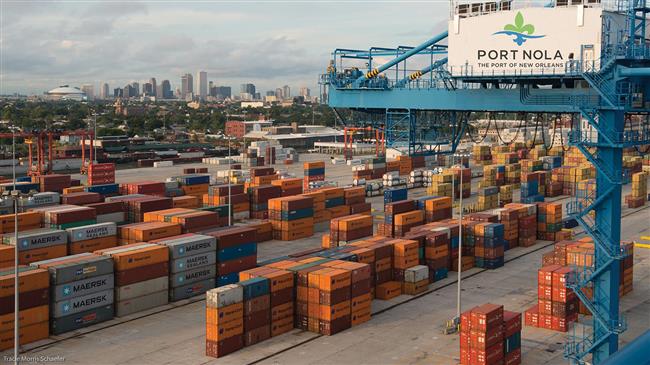US ports fear they will be big losers in trade war
American ports are alarmed at the thought of becoming big losers as the intensifying trade war between Washington and Beijing is biting into business.
They worry that the tariffs the two world’s economic powers are levying on one another might crimp shipments, cutting into port revenues.
Following the latest tit-for-tat this week between the United States and China, Kurt Nagle, head of the American Association of Port Authorities, described the state of play as "concerning."
"The total amount of tariffs and international retaliation affect 10 percent of the total trade in American ports," or about $160 billion in revenues, Nagle said.
So far, the various trade fights have had a mixed effect, with some ports reporting dramatic declines in some products, even as others saw an increase in activity aimed at beating the new levies.
The US economy is sustained by around 100 ports across the country that manage the flow of goods inbound and outbound at points of embarkation along the Pacific and Atlantic Oceans, the Gulf of Mexico and the Great Lakes.
Over the first six months of 2018, the port of New Orleans reported a fall of 350,000 tons of steel in comparison with the year-ago period, a significant hit for a flagship product used in a petroleum-focused region.
"It represents between three and five million dollars," said Robert Landry, vice president of the Port of New Orleans. "For us it's very big."
In Los Angeles, although there has been a surge in some products, the increase may not last after the White House imposed 10-percent tariffs on nearly 200 billion dollars’ worth of Chinese products last week and threatened duties on about 267 billion dollars more if Beijing took retaliatory measures.
In response, Beijing’s Commerce Ministry said in a statement that “in order to safeguard its legitimate rights and interests and the global free trade order, China has no choice but to take countermeasures in lockstep.”
In addition to Los Angeles, other areas will be badly impacted too, said Phillip Sanfield, a spokesman for the Los Angeles port.
"The East Coast ports in New York, New Jersey, Georgia and Virginia will also be very affected," Sanfield said.
French protesters rip down EU flag as ‘Frexit’ rally turns into open defiance of Brussels
Israeli attacks kill two more Palestinians in Gaza shortly after deadly widespread strikes
VIDEO | Displaced families in al-Dabba camp struggle amid severe shortages
VIDEO | Gaza rejects Israeli claims of rising births amid collapse of healthcare system
VIDEO | Gaza’s markets reopen amid ongoing challenges
VIDEO | Gazans slam US military threats against Iran
UNRWA: Israel carrying out 'silent war' in occupied West Bank
VIDEO | Fighting British state











 This makes it easy to access the Press TV website
This makes it easy to access the Press TV website